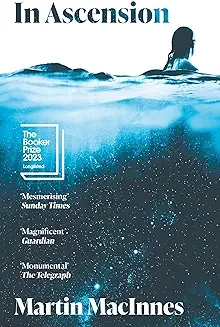In Ascension
Martin MacInnes
London: Atlantic Books, 2024
ISBN: 9781838956271
499 pp.
From Rotterdam to the stars (which is revealed on the back cover), a Dutch woman, Leigh, both pursues mysteries at the heart of life itself on Earth and is also escaping an abusive childhood that continues to haunt her. This she accomplishes by the means of the sea, which has always been the saviour of the Dutch – and also their most deadly doe as it threatens inundations in the heartlands of their people. Although it is not always made prominent in history lessons in the UK, it was the Dutch VOC that acted as the predecessor and in some cases the role model for the British East India Company and all the other merchant ventures that built the British Empire. The Dutch had colonies on Java and Taiwan that preceded any British presence in the region and their influence is discernible to the present day. Leigh’s father, the source of the abuse, also served at sea when his own dreams were dashed. In due course, Leigh herself will find her own career focused on the oceans and this is the opportunity for her to put distance between herself and her family even when they need her the most.
In common with other forms of literary science fiction, this is a book which has as a central theme the inability to communicate. This is reflected by the lack of clarity at some of the most central moments of the plot (which will put some people off, I would imagine, people who were disappointed by the ambiguous ending of the Blair Witch Project, for example). In this sense it reminds me of two of the great monuments of science fiction, which are Stanislaw Lem’s Fiasco and its ancestor Gulliver’s Travels. Gulliver, I think it is no great spoiler to report, heads to various fantastical places around the world where he is amazed by tiny people, giants, magicians and, ultimately, the talking horses. In each case, the differences between the sailor and his divers hosts are so great that they are either causes of conflict or else affect him so profoundly that he can no longer communicate with his own kind. A similar theme is explored in Fiasco, where – in the beginning section – the failure of the aliens to respond to human overtures inspires the latter to resort to threats, which escalate and lead to an obvious and avoidable disaster. There are, of course, many other examples of this theme, both on the page and on the screen. Cixin Liu’s The Three Body Problem, now available in both forms, is predicated on the dreadful dangers of attempting any form of communication with the denizens of the void. In the case of In Ascension, (award-winning and highly-regarded) author Martin MacInnes aims for the sublime – there are also elements of Lem’s The Message and Solaris in the relationship between Leigh and her research subject, not to mention Leigh and her crewmates and their different interactions with their own family members. We come close, in other words, to understanding a profound truth but we never actually get there.
This book was longlisted for the Booker Prize of 2023 and did go on to win the Blackwell’s Book of the Year award and it is not difficult to see why this should be so. The writing is excellent throughout and the characters reveal themselves in ever greater depth, all without the benefit of being able to communicate effectively with anyone else. The distance between people can be very great in this sense and that will only be accentuated when people start diving into unprecedentedly deep trenches in the ocean or haring off into the cosmos in the hope of making sense of it all through a grand gesture. Even people who profess not to like science fiction might find themselves won over by this one.
John Walsh, Krirk University
